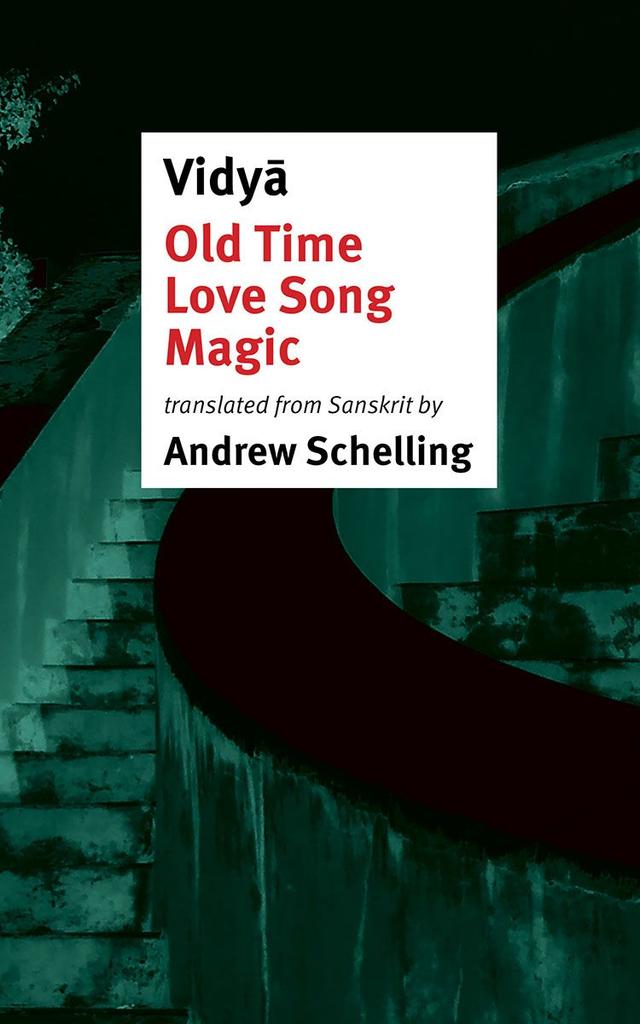Old Time Love Song Magic
Old Time Love Song Magic by Vidyā
Translated from Sanskrit by Andrew Schelling
First edition. Publication date: November 2025
Old Time Love Song Magic is two books in one. The first collects Andrew Schelling’s translations of the thirty-odd existing poems by Vidyā, who may have been the earliest woman to write poetry in Sanskrit. Vidyā’s poetry, which comes to us from around 8th century India, is love poetry, and like all good love poetry, it spans a wide spectrum of feeling, from arousal to playfulness to despair. These poems are gracefully attentive to a natural world that spans the centuries with immediacy. Schelling’s translations reject melodrama and instead draw on an intimacy with the deep past, his language leaping from the originals and landing hard and true in the present moment.
Schelling has been translating and retranslating Vidyā for decades. The second book draws on the insights and knowledge gained through that process. It contains previous translations of the poems and reflections on Vidyā’s words, references, and environment. These little essays expand the world of each poem and reveal the subtle paths translation invites us to follow, taking us deeper into the work, past rhythms, and desire itself.
Excerpts
Cascadia Poetics Lab, December 14, 2025: An excerpt from Old Time Love Song Magic, with an interview with Andrew Schelling
Praise
I'm undone! Only three poems in, and I can see the truth of your prophecy. How am I going to get any work done with Vidya moving in, and not just next door? The snicker-snack of her bladelike eyes piercing my ancient Chinese armor. I fear it's too late to dial 911. Too late to grab my go-bag and head for the hills and the solace of my hermit friends. What can I do but dive into the Ganges of her love? Another fine mess you've gotten me into.
Red Pine
This tantalizing compendium of poetry with commentaries, generously offered by poet Andrew Schelling, arrives at a crucial moment. It is a shimmering reminder, a goad, a puja, a scent of blue lotus, a scold with torrents of rain, a cucumber garden, and crystalline observation that indeed “every kalpa ends in collapse.” Vidyā—the magnificent wise passionate Sappho of India—soars thru 21st century neurotic mind with deft wit, fierce seduction, ordinary and sublime magic. As if the clouds suddenly lifted to reveal a gnosis and antidote to the Kali Yuga’s intensifying samsara and monstrous war on human imagination! As if love and poetry had abruptly fled a toxic planet of woe—yet heard our call. These elegantly honed translations and their codas of scholarship (with meters: the doe, tiger’s play, girl with a garland) bring us back to life. “Friend,/ why doesn’t this heart / break into a hundred/ brittle shards?” Vidyā’s voice answers, It does, and reveals the cosmic runes and mirrors of poetry.
Anne Waldman
Careening between the sensual pleasures of fulfilled love and the humiliating grief of rejection, here is life lived in the body of a medieval woman. But this is hardly female experience filtered through the high arts of male court poets. Vidyā emerges, in Andrew Schelling’s frank, refreshingly contemporary translations, their variants, and illuminating commentaries, as a woman of hard-won knowledge: of Sanskrit aesthetics, the erotic arts, the natural world, and soteriology. The pursuit of sexual satisfaction in these ravishing poems is unabashed, electric—“the wild game.”
Subhashini Kaligotla
Upcoming Events
February 14, 2026 at 6:00 PM: Tor House, Carmel, California
Andrew Schelling will read from Old Time Love Songs at the Robinson Jeffers Tor House Foundation, 26304 Ocean View Avenue, Carmel-by-the-Sea, California. Reservations can be made at the link.
February 17, 2026 at 5:00 PM: Rolfe Room, Seattle University
Andrew Schelling and Red Pine will read translations from classical Chinese and Sanskrit at the Rolfe Room, Seattle University. Free and open to the public.
